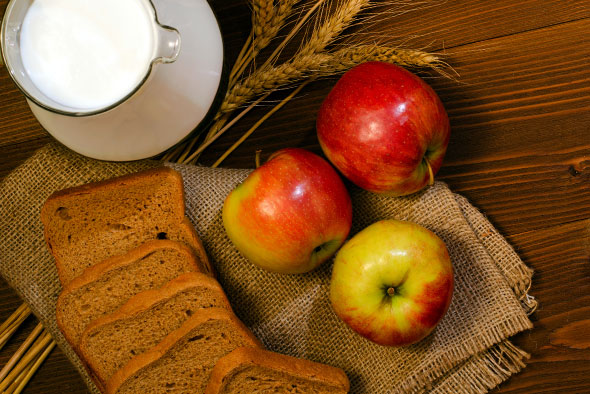
Are All Carbs Created Equal?
The Carb Corner

There is a lot of information on topics regarding nutrition and sometimes it can be confusing to navigate and understand what you should be eating. This can be especially true when it comes to understanding carbohydrates. Some people group all carbohydrates into the same category, whether they come from white rice, cookies, quinoa or an apple. There are ways you can make better choices in regards to the carbohydrates you choose because some will have more nutritional value than others. This Carb Corner will help you to take a look at specific carbohydrates and what some of the better choices are when it comes to picking quality carbohydrates for your diet.
Navigating the Carbohydrate Terms
Many terms are used when talking about carbohydrates this can make it difficult to understand if you are picking a good carbohydrate choice especially when it comes to
managing your diabetes.
Simple Carbohydrates vs. Complex Carbohydrates
Both simple and complex carbohydrates are broken down by the body and used as energy. The key difference is how quickly they are broken down by the body; simple carbohydrates break down more quickly whereas complex carbohydrates tend to digest more slowly which can help regulate your blood sugar.
- Simple carbohydrate foods: fruit, milk and many processed foods such as candy, syrups and soft drinks.
- Complex carbohydrate foods: breads, beans, pasta, quinoa, and starch vegetables (potatoes, corn, peas, etc.).
It can be confusing because some people will say that all simple carbohydrates are “bad” and all complex carbohydrates are “good”. An apple is a very healthy simple carbohydrate and white bread is a complex carbohydrate but may not be as nutritious as the choice of the apple. It is more important to pay attention to the actual food and the nutritional value.

Whole Grains vs. Refined Grains
Foods made from wheat, rice, oats or barley are considered grains. Dietary recommendations often state that half of the grains we eat should be whole grains but what are whole grains vs. refined grains?
According to USDA a whole grain item will contain the entire grain kernel which provides sources of fiber and important vitamins and minerals. A refined grain will have parts of the kernel removed - taking away the fiber and natural vitamin and mineral sources. Some of these products will be enriched to add back the vitamins and minerals but will still be missing the fiber component.
- Whole grain foods: whole wheat flour, oatmeal, corn meal or brown rice
- Refined grain foods: white flour, white bread, or white rice
It is important to pay attention to foods that have been processed to help understand if they are whole grains or refined grains. Try to stick to the whole grain items when they are available for the healthier choice.
Myths and Facts
Myth:
Eating too much pasta or potatoes gave me diabetes.
Fact:
Eating too much of a specific carbohydrate is not what causes diabetes. Type 2 diabetes is caused by genetics and lifestyle choices so too much of any one food alone will not cause diabetes. Eating too much in general can contribute to being overweight which is a risk factor for diabetes.
Myth:
I can’t east pasta, potatoes, rice and bread if I have diabetes.
Fact:
You can eat pasta, potatoes, rice and bread if you have diabetes. As mentioned above try to stick with the healthier choices such as whole wheat pasta vs. white pasta or brown rice vs. white rice. It is also important to watch portion control. As a good visual is no more than ¼ of your plate should have a starchy grain or vegetable.
Myth:
People with diabetes shouldn’t be eating the same meals or foods as non-diabetic individuals.
Fact:
A healthy diet for people with diabetes or without diabetes is similar. It should be a diet based on non-starchy vegetables, whole grains, fruit, healthy fats and lean proteins. If you have diabetes, it is important to understand your eating habits so you can work with your doctor or dietitian on dietary recommendations to help regulate your blood sugar.
Myth:
I am not allowed to eat any desserts if I have diabetes.
Fact:
Regardless of whether you have diabetes or not, desserts should be enjoyed in moderation. You can still enjoy a dessert if you have diabetes but it is extra important to monitor portion control. Be mindful of the total carbohydrate amount of your whole meal. Often times it is best to have a half portion of the dessert to help control the amount of carbohydrates you are getting in a sitting.
Myth:
I can only drink sugar-free drinks if I have diabetes.
Fact:
Many people forget to count their liquids when thinking of calories or carbohydrates if they are counting carbs. You can have non-sugar free drinks such as milk or juice, but just as with other foods, it is important to check the total carbohydrate amount in a serving and pay attention to how many carbohydrates that drink is contributing to your meal.
It is important to remember that this information should be used as a guideline
but every person has individual needs so always consult a doctor or registered dietitian about your specific dietary concerns.
Understanding carbohydrates can be confusing and is one of the most common questions our dietitians receive. The Carb Corner was created to help our blog visitors learn about the importance of carbohydrates to maintain good health!
We will continue to add to Carb Corner throughout the year. Carbohydrate counting, understanding serving sizes, recipes, snacks, what to eat in a restaurant and menu ideas.
Download the PDF version of this article.
Learn More
Balance, HCR ManorCare’s comprehensive health and wellness blog, supplies readers with healthy ideas throughout the year. The blog is designed to serve as a resource, not only for patients, residents and families, but for anyone who strives to live a healthy, “balanced” life. For more information and help in making healthy choices, go to balance.hcr-manorcare.com and sign up to receive our newsletters. If you need help making a health care decision, visit our CareFinder and live chat.
References:
http://www.todaysdietitian.com/newarchives/0416p30.shtml
https://medlineplus.gov/
https://www.choosemyplate.gov/grains


